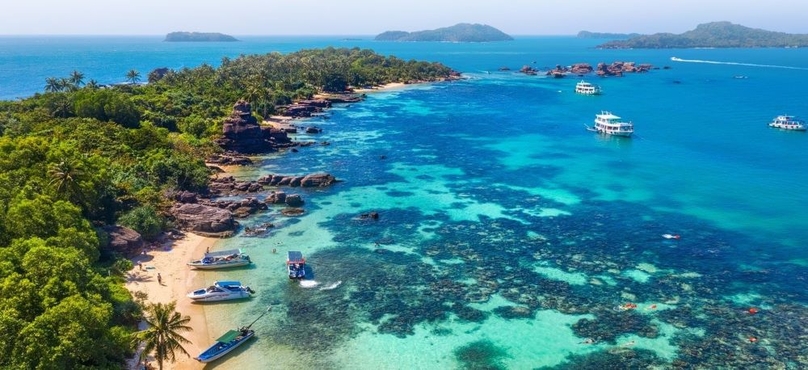Sustaining and navigating the dynamics of high-end tourism: Vietnam's appeal and strategies for enhancement
Vietnam's unique blend of ancient traditions and modern amenities has created a distinctive appeal for luxury travelers seeking immersive experiences, write Jackie Ong, RMIT Vietnam’s senior program manager for tourism and hospitality management, and Trang Pham, a lecturer at the university.

Phu Quoc, Vietnam's largest island and one of the country's top travel attractions. Photo courtesy of VinWonders.
High-end tourism is synonymous with luxury 5-star travel, representing a segment of the travel industry characterized by exclusive experiences, premium services and accommodation, and a focus on personalized and high-quality amenities with tailor-made itineraries.
Luxury travelers are characterized by their willingness to spend significantly on unique and personalized travel experiences that cater to their discerning tastes and preferences. A desire for authenticity, cultural immersion, and a high level of comfort and service drives this segment. Despite economic challenges, this niche attracts wealthy visitors seeking unique and enriching travel experiences.
The allure of Vietnam for high-end tourism
In recent years, Vietnam has emerged as a thriving tourist destination, capturing the attention of a wide range of travelers seeking new and interesting experiences. Vietnam's rise as a luxury travel destination can be attributed to its rich cultural heritage, UNESCO world heritage sites, breathtaking and diverse pristine landscapes, authentic cuisine, and a growing number of high-end hospitality establishments. The country's unique blend of ancient traditions and modern amenities has created a distinctive appeal for luxury travelers seeking immersive experiences. Vietnam’s authentic soft assets reflected through its welcoming hospitality capture the hearts of high-end travelers.
Today, luxurious hotel properties, equipped with world-class amenities, are mushrooming in Vietnam's tourism landscape. The increasing number of high-end luxury hotels such as JW Marriot, Six Senses, Ritz-Carlton, Oriental, Four Seasons, Intercontinental Hotels and Resorts, Sofitel and Banyan Tree are catering to the discerning tastes of luxury tourists, providing them with exclusive services, personalized attention, and an immersion into the country's diverse cultural offerings.
Furthermore, Vietnam's strategic geographical location in Southeast Asia makes it an attractive destination for high-end travelers looking to explore the region. Its proximity to other popular tourist destinations adds to the allure, allowing visitors to create multi-destination itineraries that include Vietnam. As well as short get-aways from the busy lifestyle.

Dr. Trang Pham, RMIT lecturer of tourism and hospitality management. Photo courtesy of RMIT.
Challenges in Vietnam's high-end tourism industry
Despite the growing popularity of high-end tourism in Vietnam, the industry faces challenges that need strategic attention. One notable challenge is the shortage of middle managers with degrees in tourism and hospitality.
According to statistics from the Vietnam National Administration of Tourism (VNAT), the demand for accommodation workers alone will be more than 800,000 people in 2025 and more than one million in 2030. On average, this field needs to add more than 60,000 workers each year.
However, vocational schools and tourism colleges can only provide around 15,000 workers for the sector annually, and the current manpower training has not met the demand.
The labour shortage will impact the seamless operation of high-end establishments, affecting the quality of services provided to luxury travelers. The demand for qualified professionals in the industry has outpaced the supply, creating a gap that needs urgent attention.
Labour shortage and the role of education
To address the shortage of middle managers, educational institutions such as RMIT’s degree in tourism and hospitality management plays a crucial role. The bachelor degree serves as a bridge, providing the necessary skills and knowledge to meet the industry's demand for qualified professionals. These recently graduated managers are the future senior managers and C-suite leaders of this sector.
Educational programs that focus on practical training, industry exposure, and the development of soft skills are essential for preparing graduates to excel in high-end tourism. Collaborations between educational institutions and luxury hospitality establishments can create internship opportunities, allowing students to gain real-world experience and establish connections within the industry.

Jackie Ong, RMIT Vietnam’s senior program manager for tourism and hospitality management. Photo courtesy of RMIT.
Promoting sustainable practices and enhancing cultural experiences
Another challenge that high-end tourism faces globally is the increasing emphasis on sustainable and responsible travel. Luxury travelers are more conscious of their environmental impact and seek destinations and establishments that align with their values. Vietnam, in order to sustain its appeal to the luxury segment, must adopt and promote sustainable practices across its tourism industry.
This involves integrating eco-friendly initiatives, supporting local communities, and minimizing the ecological footprint of high-end tourism activities. Luxury hotels and resorts can lead the way by implementing green technologies, sourcing locally-produced goods, and engaging in community development projects. Such initiatives not only contribute to environmental conservation but also enhance the overall appeal of Vietnam as a responsible and ethical luxury travel destination.
Vietnam should continue to emphasize its unique cultural experiences to further captivate luxury travelers. High-end tourists are often seeking authenticity and immersion in local traditions. Collaborations with local artisans, cultural events, and curated experiences that showcase the country's heritage can set Vietnam apart as a destination that offers more than just luxurious accommodations.
Tailoring luxury culinary, wellness, and shopping expeditions showcase local authenticity, and further developing destinations like Ha Long Bay into premium cruise experiences also taps into luxury travelers’ interests. Combining top-tier amenities and rare cultural encounters into curated high-end tour packages, Vietnam can boost its appeal as an exclusive, exciting travel experience warranting luxury guests’ strong investment and interest. The allure remains; Vietnam needs to calibrate its offerings better to captivate those seeking the finest tourism has to offer.
Investing in infrastructure and tourism facilities
Infrastructure development plays a crucial role in sustaining and enhancing high-end tourism. Improvements in transportation, including airports, seaports and jetties, water and road networks, can make it easier for luxury travelers to explore different regions of Vietnam. Additionally, investing in state-of-the-art facilities, such as conference centers and entertainment venues, can attract large-scale MNC events, further boosting the country's ability to attract this high-spend segment.
The lucrativeness of high-end tourism development inspires numerous countries to follow models like Dubai in attracting wealthy visitors. Places worldwide are now developing exclusive mega-resorts and hotels catering to free-spending elites over mass tourism. Cambodia rebranded itself from “less-developed” to luxury by building posh resorts along untouched coasts and islands. China enabled famous chains like Sheraton to build opulent Hainan properties beside five-star beach hotels rapidly. This “high yield, low volume” tactic focuses on lavishness over volume.
Product development and destination branding
Effective marketing strategies are essential for promoting Vietnam as a top-tier luxury travel destination. Collaborations with international luxury travel agencies, participation in prestigious travel shows, and targeted digital marketing campaigns can elevate the country's profile among high-net-worth individuals. Creating a strong and consistent brand image that highlights Vietnam's unique offerings will contribute to its sustained success in attracting luxury travelers.
As Vietnam emerges as a luxury destination, understanding and catering to high-end visitors' preferences based on nationality and age is critical to future growth. Westerners seek elite lodging and rare adventures. Gulf nation holidaymakers prioritize lavish shopping near 5-star hotels. Chinese tourists prefer hip, personalized urban encounters, favouring boutique stays over large resorts.
Generational differences matter too – Gen Z prefers artsy cities, while older groups go for beach resorts. To attract aging Western travelers, coastal havens like Nha Trang must emphasize glitzy hotels, seaside activities, and premium dining. Creative hubs like Hanoi and Ho Chi Minh City should provide specialized cultural outings and posh short-term apartments to lure Chinese Gen Zers.
In conclusion, Vietnam's ascent as a high-end tourism destination is undeniable, driven by its cultural richness, scenic beauty, and a growing number of luxury accommodations. However, challenges such as the shortage of skilled labour and the increasing importance of sustainability must be addressed to ensure the continued growth of this sector.
Through education, sustainable practices, cultural enrichment, infrastructure development, and strategic marketing, Vietnam can overcome these challenges and enhance its appeal to the discerning luxury traveler, solidifying its position as a premier destination for high-end tourism.
- Read More
Decoding the attraction of 'A.I Real Combat' contest broadcast on Vietnam Television
Vietnam’s first national artificial intelligence competition, 'A.I Thực chiến' (A.I Real Combat), aired its opening round at 8 p.m. Wednesday on state broadcaster VTV2, with a rebroadcast on VTV3 two days later.
Companies - Thu, November 27, 2025 | 8:17 pm GMT+7
Foxconn Industrial Internet’s Vietnam revenue jumps 83% on automation, digitalization: CEO
Foxconn Industrial Internet (FII), a unit of Taiwanese electronics giant Foxconn, saw revenue from its new-technology applications in Vietnam rise 83% in the past fiscal year while headcount increased only 20%, driven by automation and digitalization.
Companies - Thu, November 27, 2025 | 4:56 pm GMT+7
SHB bank sees development drivers from capital-raising strategy, opportunities to attract foreign inflows
The upcoming capital-hike strategy is expected to position Saigon-Hanoi Bank (SHB) among the Top 4 private banks in Vietnam by charter capital, helping the lender maintain its competitive advantage via robust capital strength.
Banking - Thu, November 27, 2025 | 4:33 pm GMT+7
Vietnam's consumer finance major F88 launches first public bond issuance with 10% annual coupon
F88, a leading consumer finance company in Vietnam, has received regulatory approval for its first public bond issuance, offering a fixed annual coupon of 10% - a level seen as attractive amid low bank deposit rates and softer corporate bond yields.
Companies - Thu, November 27, 2025 | 4:16 pm GMT+7
Technology, innovation, digital transformation will drive Vietnam to high-income, developed-economy status by 2045: PM
Science-technology, innovation, and digital transformation will be key drivers for Vietnam to become a developed, high-income economy by 2045, Prime Minister Pham Minh Chinh said at a policy dialogue with World Economic Forum (WEF) managing director Stephan Mergenthaler.
Economy - Thu, November 27, 2025 | 3:25 pm GMT+7
220kV transmission line energized to facilitate electricity imports from Laos to Vietnam
National Power Transmission Corporation (EVNNPT) and the Central Power Projects Management Board (CPMB), in coordination with relevant units, on Wednesday successfully energized the 220kV Tuong Duong-Do Luong transmission line in the central province of Nghe An, facilitating the imports of electricity from Laos to Vietnam.
Companies - Thu, November 27, 2025 | 2:32 pm GMT+7
Government allows eligible Vietnamese citizens to enter Phu Quoc, Ho Tram, Van Don casinos
Vietnam has allowed eligible Vietnamese citizens to gamble at the Phu Quoc, Ho Tram and Van Don casinos starting November 26, per a government resolution issued on Tuesday.
Economy - Thu, November 27, 2025 | 2:02 pm GMT+7
HCMC signs partnership deals with World Economic Forum, blockchain giant Binance
Ho Chi Minh City on Wednesday issued a joint statement with the World Economic Forum (WEF) on an initiative to promote smart manufacturing and responsible industrial transformation in Vietnam, while signing an MoU with Binance to promote the development of the country's International Financial Center.
Economy - Thu, November 27, 2025 | 11:28 am GMT+7
Red Capital exits major shareholder position in EVN's subsidiary VSH
Red Capital Asset Management JSC has ceased to be a major shareholder of Vinh Son-Song Hinh Hydropower JSC (HoSE: VSH), a subsidiary of state-owned Vietnam Electricity (EVN), after sharply reducing its stake.
Companies - Thu, November 27, 2025 | 7:55 am GMT+7
VAFIE, Hung Yen province authority accompany taxpayers
The Vietnam's Association of Foreign Invested Enterprises (VAFIE) and Hung Yen province's tax authority on Tuesday held a workshop on corporate tax policy updates and key notes on 2025 corporate income tax filings.
Companies - Wed, November 26, 2025 | 8:15 pm GMT+7
Thailand’s Super Energy earns $81 mln in Jan-Sep revenue from Vietnam
Super Energy Corporation, a Thai renewable-energy developer, recorded about THB2.62 billion ($81.28 million) in revenue from its Vietnam operations in the first nine months of 2025, according to its Q3 earnings report.
Companies - Wed, November 26, 2025 | 4:51 pm GMT+7
Turning point of Vietnam's fund management industry: exec
Vietnam’s asset management industry is entering a pivotal phase as the country seeks to diversify capital flows and strengthen long-term funding, said Lu Hui Hung, CEO of Phu Hung Fund Management, citing the Ministry of Finance's recently issued Decision 3168.
Finance - Wed, November 26, 2025 | 4:42 pm GMT+7
Gelex Infrastructure okayed to launch IPO of 100 mln shares
Gelex Infrastructure JSC has received approval from the State Securities Commission of Vietnam to proceed with an initial public offering of 100 million shares, the company said.
Companies - Wed, November 26, 2025 | 3:52 pm GMT+7
Seven young PV Gas employees selected for Petrovietnam’s 'Outstanding Youth 2025' program
Seven young employees of PetroVietnam Gas (PV Gas) have been selected for Petrovietnam’s “Outstanding Youth 2025” program, an initiative aimed at identifying and developing high-potential talent across the state energy group.
Companies - Wed, November 26, 2025 | 3:01 pm GMT+7
Deep C Industrial Zones in northern Vietnam draws three new projects worth over $242 mln
Deep C Industrial Zones in Quang Ninh province has secured three new investment projects with combined registered capital of about VND6.38 trillion ($242 million), reinforcing its position as an attractive destination for manufacturing and logistics.
Industries - Wed, November 26, 2025 | 1:58 pm GMT+7
Billionaire Pham Nhat Vuong's son takes helm at VinMetal as Vingroup pledges support for loss-making steel producer Pomina
Vingroup, Vietnam's biggest listed company by market cap, said its steel subsidiary VinMetal will provide Pomina Steel with a zero-interest working capital loan for up to two years, helping the troubled steelmaker stabilize operations and restore cash flow.
Companies - Wed, November 26, 2025 | 12:38 pm GMT+7
- 2024 in review and 2025 forecasts
-
Vietnam sets GDP growth target at 10% for 2026
-
USD price likely VND26,400 in Q4, VND26,300 in Q1/2026: UOB forecast
-
Many foreign firms borrow in Vietnam as interest rates lower: MBBank CEO
-
Vietnam’s 10-month FDI disbursement hits 5-year high
-
Vietnam's manufacturing sector sees sharp rises in output, new orders in Oct: S&P Global
-
Standard Chartered, HSBC raise Vietnam growth forecasts for 2025
























